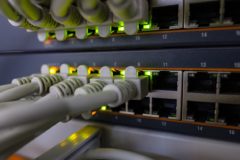What is the internet of things? The Internet of Things (IoT) is a computing concept, first attributed to Kevin Ashton an expert on digital innovation, that describes an impending future where everyday run-of-the-mill physical objects will be connected to the Internet and be able to identify themselves to other devices. It is a development in which objects, animals and people are fitted with the ability to automatically transfer data over a network without needing human-to-human or human-to-computer communication. The ‘thing’ can be a person with a heart monitor implant, a farm animal with a biochip, an automobile that has built-in antennas to alert the driver when tire pressure is low or just any other natural or man-made object which is assigned an IP address and provided with the ability to move data across a network.
While the Internet of Things (IoT) is a vision, it is being built today. The information paths are evolving. In developed countries, pill-shaped micro cameras already move through the human body and return images to identify sources of illness; accurate farming equipment with wireless links to data collected from remote satellites and ground sensors that can take into account crop conditions and adjust the way each individual part of a field is farmed are in operation; billboards in Japan now look back at passers-by, evaluating if they fit the suitable consumer profiles, and change displayed messages based on those calculations.
In this part of the world, the adoption of smart technology is largely slow, which translates to the fact that adoption of the Internet of Things will take time, but the improvements in underlying technologies such as wireless networking technology and cloud computing, are advancing the adoption time line, in fact a time frame has been given.
There is no time to play catch-up. We have to keep up because technology is advancing exponentially. Nigerian startups and tech companies need to get with the development.
A new report by Pew Research Centre shows that experts believe the Internet of Things will have a widespread world-wide effect on the way we live our everyday lives by 2025, about 11 years from now, despite the slow adoption and progress.
Author of the report, Janna Anderson, says that experts believe that the next revolution in digital technology will be heralded by the rise of this embedded technology- and wearable devices, which is not surprising; smartwatches and fitness trackers are among the top categories expected to take off in the Internet of Things.
Although there are some household items are already connected to the Internet such as the Samsung’s Internet-connected refrigerator, but it is not without its restrictions. Privacy issues and compatibility, need I say more?
Soon, manufactures and startups that will embed information about transportation, pollution levels and even deliver news about electricity and water into devices and smartphone apps will spring up. Real-time data about fields, oceans and soil moisture is also on the radar for tech growth, as is the goods and services industry.
So what will really happen when things, homes and cities become smart? The report says the upsides are enhanced health, convenience, productivity, safety and vastly more useful information for people and organizations. The downsides: challenges to personal privacy, over-hyped expectations and tech complexity and the ever present possibility of people recasting their human relationships with technology-based ones.
Photocredit: Business Insider


















